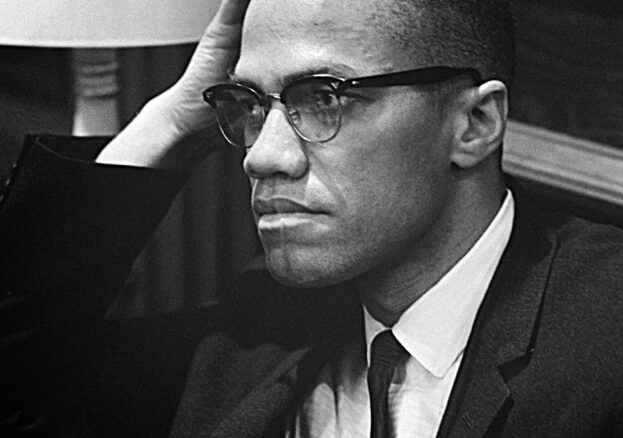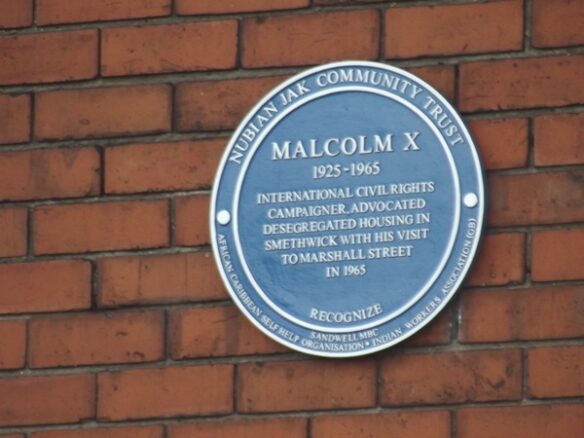
This visit, though often overlooked by mainstream historical narratives, provided a critical reflection on the state of race relations in Britain, exposing uncomfortable truths and leaving a lasting impact that resonates to this day.
Malcolm’s primary destination was Smethwick, a small industrial town in England’s West Midlands, which had gained notoriety for its explicitly racist climate during the mid-1960s. The town had recently captured national attention through a deeply divisive political campaign during the 1964 general election. Conservative candidate Peter Griffiths had unapologetically capitalised on anti-immigrant sentiments, using the inflammatory slogan, “If you want a nigger for a neighbour, vote Labour.” Griffiths’ election was a stark indicator of Britain’s simmering racial tensions, shattering the myth of British tolerance and exposing widespread prejudice.
Upon arriving in Smethwick, Malcolm was confronted with an environment openly hostile towards racial minorities. Marshall Street had become infamous due to explicit discriminatory housing policies, reinforced by signs barring “coloured” individuals from renting or purchasing homes. The reality Malcolm encountered—streets marked by racial segregation, signs promoting hatred, and blatant exclusion—shocked even him. Despite his familiarity with America’s own entrenched racial divisions, Malcolm openly declared, “This is worse than Harlem,” delivering a penetrating critique of Britain’s self-image as a tolerant society.
 Malcolm’s invitation to Smethwick had come from Avtar Singh Jouhl, a leader of the Indian Workers’ Association (IWA), an organisation actively campaigning against racial discrimination. Jouhl recalled Malcolm’s visit vividly, stating, “When Malcolm came to Smethwick, he was calm but clearly disturbed by the racism he witnessed. He told us we must not be silent and must always confront injustice wherever we find it.” During his stay, Malcolm engaged directly with local residents, confronting discrimination head-on. He visited establishments openly denying service to people of colour, spoke with residents who shared stories of ongoing prejudice, and toured areas marked by racist slogans and graffiti.
Malcolm’s invitation to Smethwick had come from Avtar Singh Jouhl, a leader of the Indian Workers’ Association (IWA), an organisation actively campaigning against racial discrimination. Jouhl recalled Malcolm’s visit vividly, stating, “When Malcolm came to Smethwick, he was calm but clearly disturbed by the racism he witnessed. He told us we must not be silent and must always confront injustice wherever we find it.” During his stay, Malcolm engaged directly with local residents, confronting discrimination head-on. He visited establishments openly denying service to people of colour, spoke with residents who shared stories of ongoing prejudice, and toured areas marked by racist slogans and graffiti.
This firsthand experience allowed Malcolm to highlight the global nature of racial injustice, challenging Britain to recognise and address its own embedded racism. He explicitly rejected the convenient narrative that racism was solely an American problem, urging British society to confront and dismantle its internal prejudices and systemic inequalities.
Malcolm also addressed a crowded hall at the Birmingham University Students’ Union, delivering a powerful message that resonated deeply with the predominantly young audience. He asserted passionately, “I believe in human beings, and that all human beings should be respected as such, regardless of their colour.” His speech became a catalyst for reflection and action among students, many of whom would later become active participants in Britain’s civil rights and anti-racist movements.
Despite its significance, Malcolm’s visit remained largely unacknowledged in Britain’s historical accounts for decades. Only recently have dedicated activists, historians, and community organisers successfully begun reclaiming and commemorating this critical event. A commemorative blue plaque now marks Malcolm’s presence in Smethwick, and vibrant murals honour his contribution, serving as reminders of the enduring relevance of his courageous stance against racism.
Beyond symbolic recognition, Malcolm’s brief but impactful presence contributed to tangible social and legislative changes. His visit, alongside continued local advocacy, influenced public opinion and policy, notably helping to push Britain toward passing the Race Relations Act of 1965. Though limited in scope, this act was Britain’s first legal attempt to address racial discrimination, setting a precedent for subsequent and more comprehensive legislation.
Today, Malcolm’s message continues to resonate profoundly, particularly as Britain once again grapples with persistent racial inequalities amid contemporary societal challenges. The racial disparities Malcolm confronted—such as unequal access to employment, education, healthcare, housing, and the discriminatory practices in policing—remain prevalent issues. The resurgence of the Black Lives Matter movement, both globally and within Britain, underscores the continued importance of Malcolm’s emphasis on grassroots activism, solidarity, and an international approach to fighting racial injustice. However, this resurgence has not been without backlash. In Britain, as in the United States, protests have been met with political resistance, media scepticism, and attempts to reframe the movement as divisive. Calls to address systemic racism have been challenged by those who argue that Britain is a post-racial society, and efforts to diversify education or reform policing have been met with accusations of cultural erasure or political correctness gone too far. This reaction reveals the depth of discomfort that often accompanies honest discussions about race. Yet, the very presence of such resistance affirms the relevance of Malcolm’s core message: that justice requires not just acknowledgement of inequity, but also an unwavering commitment to confronting it.
Malcolm X’s forgotten British encounter invites contemporary society to reflect deeply on persistent racial inequalities and the complexities of British identity and history. It highlights the necessity of confronting historical injustices honestly to achieve meaningful social progress. Revisiting this critical historical moment fosters greater awareness and understanding, challenging Britain to actively address and dismantle systemic racism.
As Malcolm’s legacy endures, Britain faces an ongoing imperative to engage with its complicated racial history transparently. This historical moment provides critical insights that continue to inform contemporary movements for justice and equality. Malcolm X’s unwavering advocacy for dignity, equality, and human rights remains an essential guiding light, encouraging sustained activism and solidarity across diverse communities.
Ultimately, Malcolm X’s British visit serves as a powerful reminder that confronting racism is not merely a historical exercise but an ongoing moral and societal obligation. Malcolm’s conviction that injustice must be confronted “by any means necessary” challenges Britain today to recommit to dismantling racial inequalities. By remembering and honouring Malcolm’s brave and profound impact, Britain can move forward with greater honesty, inclusivity, and determination toward achieving genuine racial justice and equality.
